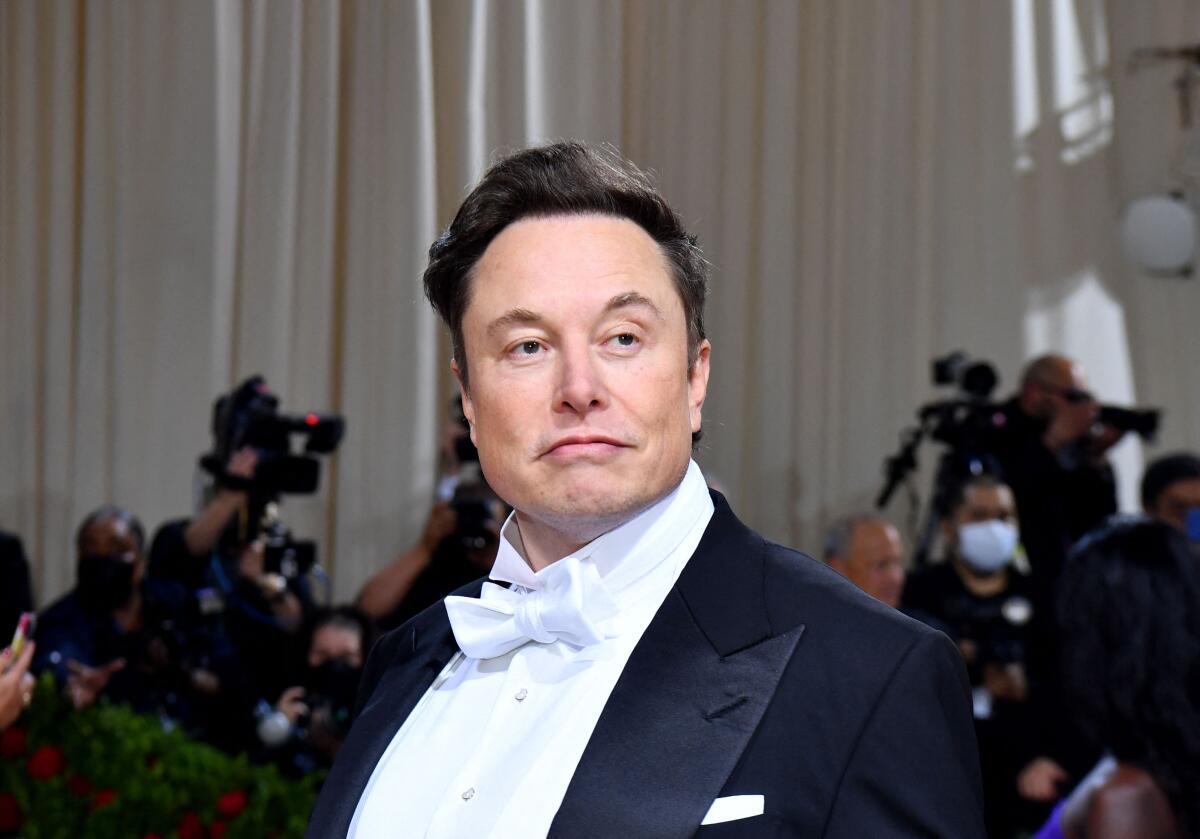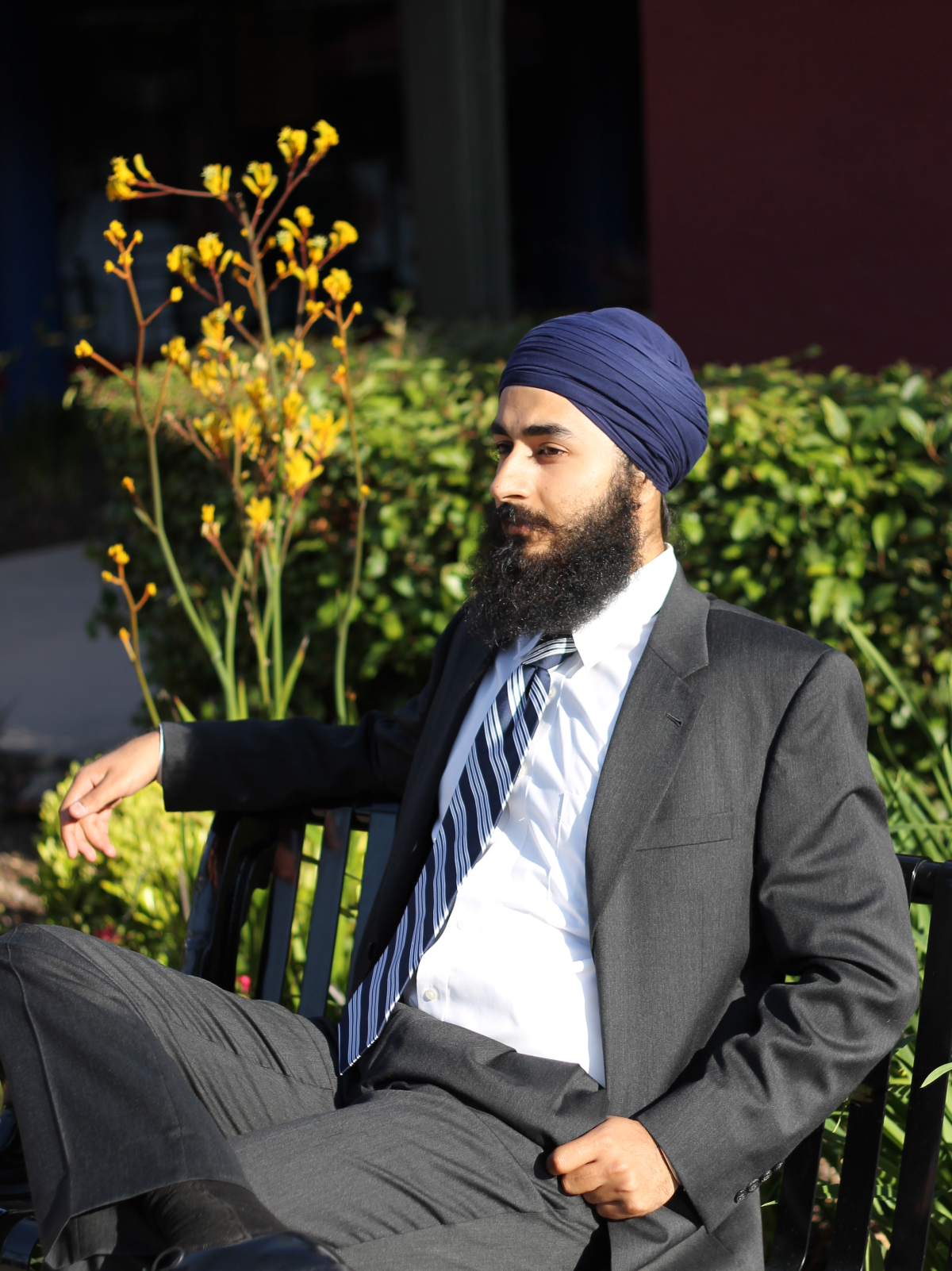Musk said he’d never settle an unjust legal case against him. He just settled this one

- Share via
A year ago this month, Elon Musk proclaimed his position on guilt and innocence in a tweet.
“My commitment: We will never seek victory in a just case against us, even if we will probably win,” he wrote. “We will never surrender/settle an unjust case against us, even if we will probably lose.”
Recently, Musk surrendered. Rather than persist in fighting a nearly 3-year-old defamation lawsuit filed by graduate student Randeep Hothi, the pugnacious chief executive of Tesla cried uncle, settling for $10,000. Musk’s lawyers offered to settle several weeks ago, and on Monday, Hothi said, he accepted.
Hothi’s suit accused Musk of defaming him in an email claiming that Hothi “almost killed” a Tesla security guard in the parking lot of the company’s factory, with no basis in fact.
“Last year, Musk famously promised that he would never ‘settle an unjust case.’ Yet, he has asked Mr. Hothi to accommodate him,” D. Gill Sperlein, one of Hothi’s lawyers, said in a statement Monday. “We welcome Musk’s belated acknowledgment that this case was just.”
Musk’s lawyer’s have yet to respond to emails or phone calls from The Times.
For the record:
4:36 p.m. May 1, 2023A previous version of this article miscalculated the settlement as a percentage of Elon Musk’s estimated net worth. The $10,000 payout represents 0.000006% of $165 billion, not 0.00000006%.
To be sure, the cave-in is unlikely to alter billionaire Musk’s jet-set lifestyle. Ten thousand dollars equals 0.000006% of his estimated net worth of $165 billion.
Another way to look at it: If a family’s net worth totaled $165,000 (well above the U.S. median) and the settlement percentage was the same, that family would have to write Hothi a check for 1 cent.
Whether Musk settled because he changed his mind and decided that Hothi’s was a just case, or for some other reason, only Musk knows. He did not respond to requests for comment.
The case
So who is Randeep Hothi, anyway, and what was the defamation suit about?
The defamation part is simple: Hothi’s lawyers argued that when Musk wrote the email in 2019 claiming that Hothi “almost killed “ a Tesla security guard, with no evidence to back it up, he defamed Hothi.
Tesla dropped its case against Randeep Hothi after a judge ordered the company to turn over video and audio evidence to prove its case.
The who-is-Hothi part is a bit more complicated: A graduate student at the University of Michigan but living in the Bay Area in early 2019, Hothi began monitoring auto production from outside Tesla’s Fremont factory, and posting his findings on Twitter. Using the handle @skabooshka, he was popular with a group of short sellers and other Tesla critics known as #TeslaQ. (At the time, Hothi held a short position in Tesla stock.)
He was unpopular among Tesla executives, particularly Musk. The factory’s security force had recorded his license plate number and guards had orders to kick him out if they saw him nosing around.
Hothi was on a mission. He was skeptical that Musk could pull off promises of manufacturing the new Model 3 in a factory so automated and so devoid of humans it would resemble an “alien dreadnaught.”
Hothi turned out to be right — Musk’s aggressive automation attempt was an embarrassing flop and Tesla ended up assembling Model 3s in a hastily erected tent outside the factory walls. Tesla stock was under great pressure at the time from short sellers who were betting the company was about to fail. But Musk pulled it off — it may have been built in a tent, but the Model 3 proved popular, and, by Musk’s own admission, the company narrowly escaped bankruptcy in 2018, and was still struggling with production when Hothi was ejected from the parking lot.
The trouble started in February 2019, after Hothi pulled his car into the Tesla factory lot and parked. The lot is publicly accessible, and the site included a Tesla retail sales showroom that the public was invited to visit.
A guard intercepted Hothi and told him to leave. Hothi said he was going to the showroom but complied with the order. As Hothi pulled out of the parking lot, the guard was standing near the side of his car. Hothi passed him, closely. What happened physically is unclear, but after Tesla showed video footage of the encounter to local law enforcement and tried to have Hothi arrested, police and prosecutors told Tesla they found no cause.
The “alien dreadnaught” wasn’t the only source of Hothi’s skepticism. He regarded Musk’s claims that his Autopilot system would soon develop into a “full self-driving” robot car as fantastical. Musk had claimed in 2016 that a Tesla would be able to drive itself with no human intervention from Los Angeles to New York by the end of 2017. Although Tesla has been selling a $15,000 feature it calls Full Self-Driving, no Tesla, nor any commercially available car, can drive itself — not even around the block, much less across the continent.
Former engineer says Tesla forced her out and then libeled her. Her lawsuit against the company is testing the limits of the arbitration agreements that bind millions of American workers.
A few months after the factory incident, Hothi was out driving and came across a Tesla-owned vehicle with mounted cameras that Hothi assumed would be used for a video that would show off the car’s self-driving abilities. He took pictures from his car.
Tesla claimed Hothi stalked, harassed and endangered the car’s occupants, then sought and won a temporary restraining order in court.
When Tesla pressed for a permanent restraining order, Hothi told the judge that the Tesla car’s cameras could show exactly what did and didn’t happen that day. The judge ordered Tesla to enter the videos into evidence. Rather than comply, Tesla dropped the case.
Shortly after, in August of 2019, Musk was exchanging emails with Aaron Greenspan, a longtime Tesla critic who runs the legal document search engine called PlainSite. In one of those emails, Musk wrote, “[a]s for the people you mention below, they have actively harassed and, in the case of Hothi, almost killed Tesla employees. What was a sideswipe when Hothi hit one of our people could easily have been a death with 6 inches of difference.”
Greenspan was well known for sharing correspondence with people such as Musk on social media. Musk is known for writing emails to employees that are then widely distributed over the Internet. Musk never told Greenspan the emails were confidential, Greenspan said. He posted Musk’s claims about Hothi on Twitter, and they went viral.
To prove defamation, legal experts say, a plaintiff generally must show that a defendant made a false statement purporting to be fact; that it was published or communicated to a third person; that the defendant was, at least, negligent; and that the plaintiff suffered reputational damage or other harm.

Hothi, in a prepared statement Monday, said, “I brought this case to defend my work, clear my name, and send a message. I believe I’ve accomplished that, thanks in no small part to Musk, whose own behavior over the last year has highlighted the need to scrutinize his every word and deed. This case was about taking a stand, not seeking fame or money. I feel vindicated.”
His case depended on donations from friends and supporters, and those funds were not inexhaustible. If he had lost the case, he could have been required to pay the billionaire’s legal fee.
When his case was first filed, Hothi said that a simple apology from Musk was all he wanted. He hasn’t received one to date.
More to Read
Inside the business of entertainment
The Wide Shot brings you news, analysis and insights on everything from streaming wars to production — and what it all means for the future.
You may occasionally receive promotional content from the Los Angeles Times.










